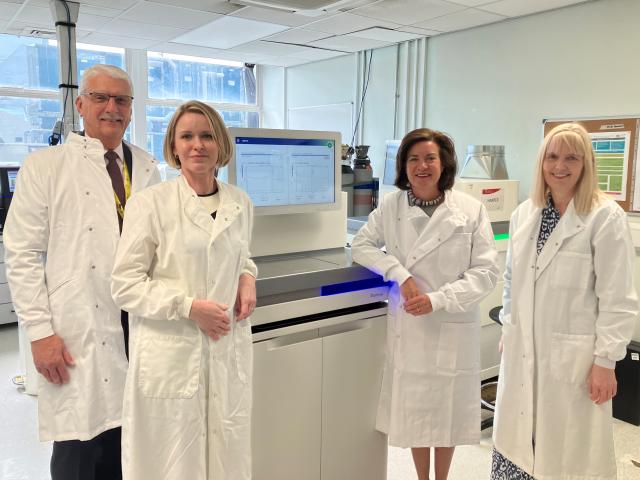
Wales at the forefront of lung cancer diagnosis research
27 October
An award winning new study with funding from Health and Care Research Wales has the potential to revolutionise the way lung cancer is diagnosed in Wales and accelerate treatments.
The QuicDNA study, supported by Health and Care Research Wales and our partners across industry, the NHS and third sector organisations, explores how a new non-invasive blood test called ctDNA can detect multiple cancer markers, and speed up the time from referral to the start of treatment.
Lung cancer is the fourth most common cancer and the leading cause of cancer death in Wales. Currently, diagnosis is carried out through a tissue biopsy, in which DNA is extracted from tissue taken from the tumour site in the lung. This is a complex and uncomfortable process and the diagnostic pathway is also lengthy.
By comparison, the ctDNA test takes a sample of DNA from a patient's blood, in a process similar to a standard blood test.
Dr Magda Meissner, a research lead for the QuicDNA study and Clinical Liquid Biopsy Lead at the All-Wales Medical Genomics Service (AWMGS), said:
We know how traumatic a cancer diagnosis can be for patients and their loved ones. This study aims to significantly speed up diagnosis so that patients can start their treatment faster, which can make the whole experience of dealing with cancer a bit less challenging.”
QuicDNA and its partners have recently been recognised at the Advancing Healthcare Awards (AHA) Cymru 2023 for its transformative impact on healthcare in Wales. The project won both the Overall Winner out of all shortlisted entrants across all categories and the Award for New Ways of Working which celebrated its innovative approach lung cancer diagnosis.
Sian Morgan, Consultant Clinical Scientist and Laboratory Director for AWMGS, said:
We are grateful this project which we are so passionate about also resonates with others. We hope that this recognition by the AHA Cymru Awards can serve as an inspiration to others within healthcare and we’re proud that the project will allow cancer patients with lung cancer to access treatments faster in the future.”
To keep up with this research and other research news sign up for our bulletin.